A racing pigeon feeding system is the process of providing your birds with the best diet to give the best energy levels for optimum training and racing.
What is a Racing Pigeon Feeding System?
If you keep racing pigeons, you will know that one of the most important factors is optimizing their diet.
There are many different ways to achieve the same results with racing pigeons in the sense that we all know what NOT to do in terms of care and diet, but when it comes to things that you SHOULD do, the specifics are a little more open to interpretation.
A Racing Pigeon Feeding System broadly consists of specific nutrients at specific times, on specific days in order to reach peak performance when it matters…
Every individual racing pigeon owner will always tell you that their methods are the best methods, but what works for one set of pigeons doesn’t always work for another.
The main thing is to decide on what is generally termed as a ‘feeding system’, which is essentially a term used to cover what your racing pigeons are going to eat and when they are going to eat it.
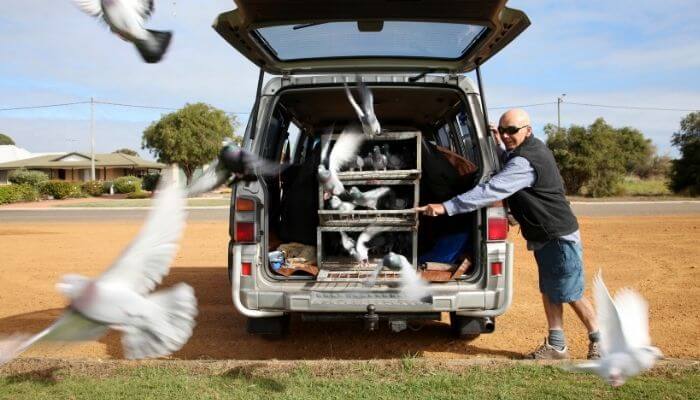
You can almost regard it in the same way that you would think about how an athlete fuels their body; specific nutrients at specific times, on specific days in order to reach peak performance when it matters the most whether it’s a club long-distance race, sprint race or a one loft race.
Examples Of Racing Pigeon Feeding Systems
There are innumerable ways you can feed your racing pigeons, in fact you will likely find that all the highest performing lofts in the world have completely different systems of fueling their pigeons for peak performance.
However, a couple of examples of racing pigeon feeding systems can be found below:
- The Pigeon Basics Forum – this system, posted back in 2008, apparently helped the posters dad win three pigeon races.
- The Tumley Lofts Stud Sprint System – This is a feeding system for Widowhood cocks that has produced champion pigeons in the Federations and Combine races.
What Do Racing Pigeons Eat?
Many sporty fanciers believe that there is no simple answer to what pigeons eat but they do agree that proteins and fats are the important elements.
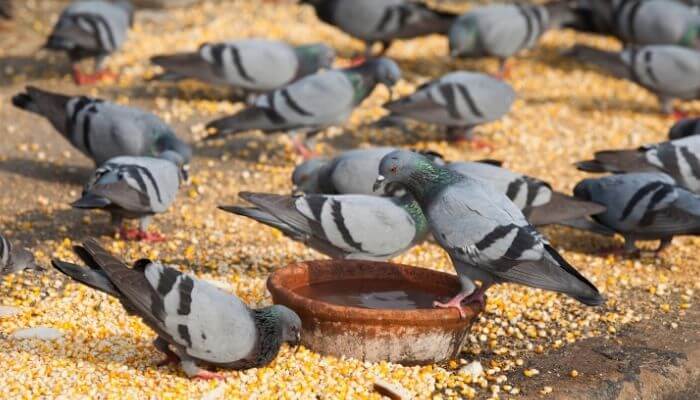
Proteins help in repairing tissues and also assist in other base metabolic purposes.
Though many will mix their own food to their own recipe, a high protein element is always included. Some of the best foods for pigeon protein include things like:
- Austrian winter peas
- Maple peas
- Mealworm
- Cowpeas
- Canada peas
- Sunflower Seeds
Overfeeding protein is not any way to increase performance and can adversely affect a pigeon.
Fats are needed (along with carbohydrates) to provide the energy an avian athlete needs. Fat produces twice the energy provided by protein.
Again overfeeding and underfeeding fats is not healthy.
It is generally accepted that the ideal food mix is the following ratio
- Protein – 12 – 17%
- Carbohydrates – 70%
- Fat – 5 – 7%
- Fibre – 5%
This mix should provide all the vitamins a pigeon needs but some owners will add supplements to the birds’ diet.
As well as proprietary supplements they might try things like cinnamon and turmeric.
Does a sprint racing pigeon need different food to an endurance racing pigeon?
If you look online, you’ll find thousands of references on feeding pigeons and mostly they are based on individual owners’ personal thoughts and experiences.
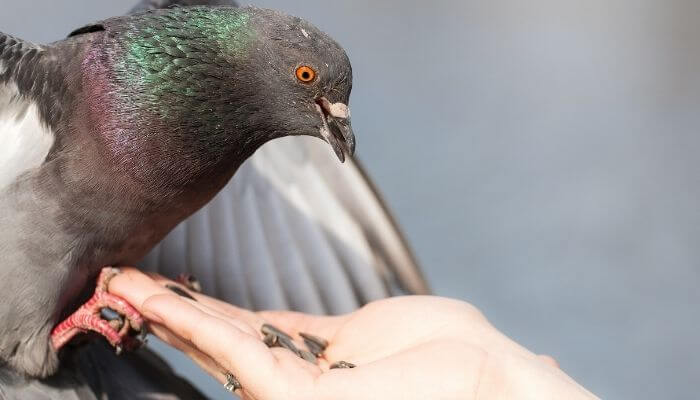
There is no scientific answer – like human athletes, every racing bird is different. Some are best suited to being Usain Bolts and others, Mo Farah.
Every owner will experiment, adjust and tweak until they think they have the perfect racing feed formula.
What Is A Feeding System?
The feeding system refers to the schedule (meal times) and the food eaten.
The first thing to do before you start trying any particular feeding systems out is to make sure that your pigeon has a healthy bowel to begin with.
Making sure that issues like E. coli, coccidiosis, canker and worms are all clear is important because an unhealthy bowel means your bird won’t gain optimum nutrition (fuel) from their feed.
The detail is in making sure that the birds are provided with exactly enough fuel to be able to sustain their period of flight and crucially not too much or too little.
What this means is that the pigeon’s fuel requirement will vary from day to day depending on whether they are training or racing, and keeping the perfect energy balance throughout the week is essential for maintaining the best peak performance.
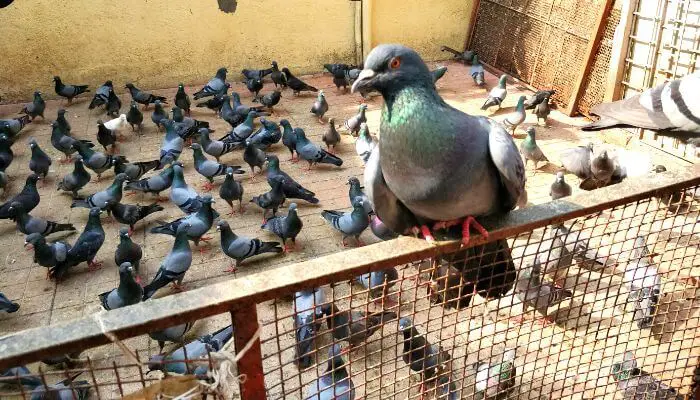
Just like humans, pigeons will not be able to perform to the best of their ability if their energy balance is off.
In young pigeons, in particular, it is essential to get their feeding system correct as quickly as possible because early depletion of their energy reserves can lead to damage in both the liver and the muscles.
The aim of the feeding system is to provide the pigeons with the correct amounts of energy that they need on any given day, whether it is a training day or a race day.
Next is to decide when to feed.
Pigeons have a high metabolism and an extraordinary high body temperature of 42ºC.
This means they need plenty of food, but also that they digest food rather fast.
The general consensus is that racing pigeons should be fed two or three times a day.
It is not the best idea to keep food on supply like maybe a fancy pigeon loft owner would because this can lead to inefficient nutrition.
Overfeeding
If you overfeed your pigeons in the lead-up to a race, then it will negatively affect their performance because they will be carrying excess baggage (known as being leady).
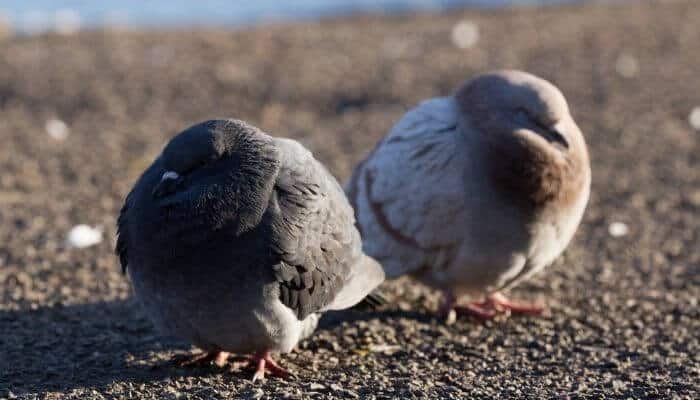
Just like us, their excess energy will be stored as fat which will lead to a loss in speed, endurance and buoyancy.
Underfeeding
Underfeeding will obviously not lead to your pigeons being ‘leady’, but it will certainly result in them being ‘underpowered’.
Feed systems that are unbalanced in the sense that there is not enough energy provided for the relative workload will inevitably lead to depletion of energy reserves in key areas like the liver and the muscles.
Go Your Own Way
As has been emphasised throughout this article, there is no perfect feeding system.
You can trial and error until you settle on the one you think works.
The important thing is that you should be happy that the feed is keeping your racing pigeons healthy and helps them perform to the best of their natural abilities.
